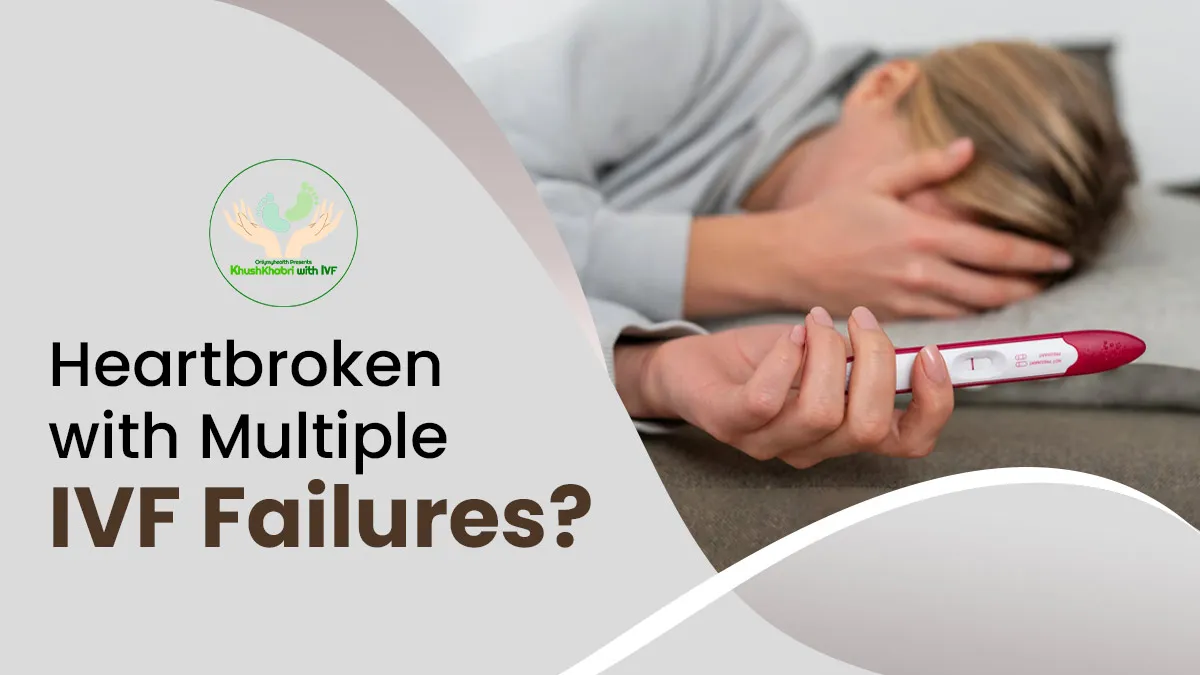
Whether it is the first IVF attempt or after multiple failures, receiving a negative result can be very upsetting for couples. By the time they reach this stage, they have already gone through several procedures like egg retrieval and embryo transfer, along with the emotional and financial investment involved. Even though IVF has a success rate of around 50–60%, many couples approach it with the hope that it will definitely work for them. So, when the result is negative, it can come as a shock. The initial reaction is often intense, many couples feel angry, frustrated, or helpless. Some express their emotions openly through crying, shouting, or questioning why things went wrong.
Table of Content:-
Impact of IVF Failures on Couples
Explaining the ordeal, Dr Anitha A Manoj, Fertility Specialist, GarbhaGudi IVF Centre says, “When doctors offer counseling and explain possible reasons for the failure of IVF, couples start to understand and gradually accept the outcome. The failure is then analysed and next steps are planned carefully.”
“Apart from the emotional toll, couples are also deeply affected by financial concerns. For many, IVF is seen as their last hope, so a negative result can be very painful. It is important to receive proper emotional support and counselling. Couples undergoing IVF failures need good guidance, understanding and reassurance from their family and the doctors,” she adds.
Also Read: Can You Conceive Naturally After Failed IVF Cycles? How Does This Happen?
Tests to consider after multiple failed IVF cycles
In the first cycle, the usual conventional methods and protocols are followed. When the first result comes negative, it is further analysed in the following ways.
- Analysing the receptivity of the endometrium, where we put the embryos i.e, uterus and the lining analysis.
- The next step is, analysing and placing the embryos. The lining can be analysed by ERA ( Endometrial receptive analysis) and other advanced techniques like ALICE and EMMA analysis, which tests the microbial flora of the uterus.
- Embryo analysis is done through pre genetic testing that is, if the couples have faced negative analysis more than twice, or if there are severe deformities, family history, low ovarian reserve, low sperm quality, aged couples or if the couple is having their first child with slight abnormalities.
- Further blood tests are considered for the couple, both genetic and biochemical analysis are performed to understand the underlying issue.
- The body might try to reject the embryo considering it is a foreign object, hence immunological analysis is performed.
- It is also important to test the compatibility of the husband and wife (HLA matching). If the embryos are not compatible (low egg and sperm quality), it has to be replaced with a third party reproduction- either the donor oocyte or donor sperm.
Also Read: Miscarriage And IVF: Timing And Considerations For Your Next Steps
How can couples rebuild hope and stay positive
Infertility, or inability to conceive naturally can cause emotional distress. Couples need emotional and psychological support from the very beginning followed by repeated counselling. Couples are told to have a positive approach which can help them to plan further steps. A counselor can help navigate feelings and hopelessness caused due to infertility.
Here are some tips by Dr Anitha to stay hopeful while planning their next steps:
Testimonial of positive couples: Patient case study which can help them rebuild hope. For example, stories of patients who eventually had a positive pregnancy after multiple negative results.
Importance on Analysis: There has to be more emphasis on analysing the problem of repeated failures and explaining the next steps in detail to the couple. This can help restore hope!
Also Read: Opting For IVF? Common Challenges No One Tells You About
IVF Break during the cycle: A considerable amount of break (preferably one month) during the IVF cycle is important to understand the cause of repeated failures. This break can also help hormones settle for the next embryo transfer. Another important aspect to consider during the break is the age of the patient. If the patient is above 35 years, a prolonged break is not suggested.
Counseling: More emphasis on repeated counseling can help couples navigate emotions and get back to the treatment at the earliest. Counselling can help them accept the negative result and help in planning the next steps. It is also important to restore hope which can result in a positive outcome.
Final word
It is important to mentally prepare for the possibility of a negative result, as this helps both the couple and the doctors to manage the treatment process better. Staying calm, confident, and hopeful, while maintaining emotional balance from the beginning to the end of the treatment is crucial. It is also helpful not to set very high expectations, as this can reduce emotional distress if the outcome is not what they hoped for.
Also watch this video
How we keep this article up to date:
We work with experts and keep a close eye on the latest in health and wellness. Whenever there is a new research or helpful information, we update our articles with accurate and useful advice.
Current Version